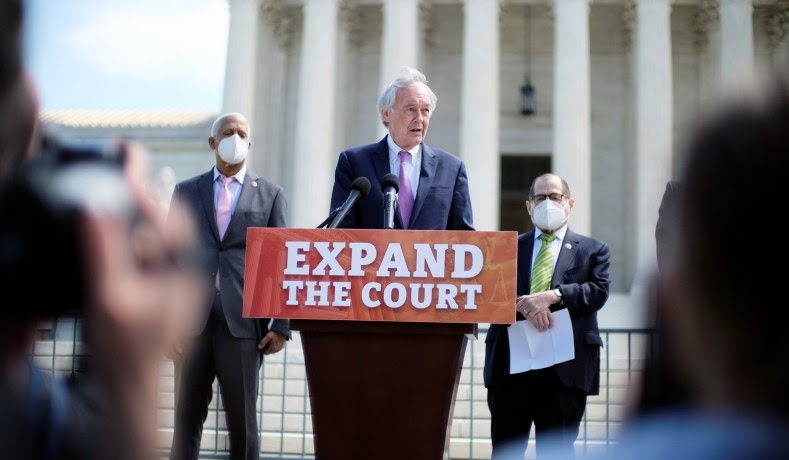Democrats Make Moves to Try and Pack Supreme Court

Image Courtesy of National Review
By Jeremy Perillo
Democratic politicians in both the White House and Congress are making moves towards their eventual hope of expanding the Supreme Court. While serious legislation and consideration of such action are not in the purview of Congress at this moment, these acts can be seen as ways of attempting to satisfy their left-leaning supporters.
President Biden signed an executive order on April 9, which established a commission to study Supreme Court reform. As part of the discussion on Court reform, the commission will look into increasing the number of justices on the Court, and the justice’s lifetime appointments.
“The Commission’s purpose is to provide an analysis of the principal arguments in the contemporary public debate for and against Supreme Court reform, including an appraisal of the merits and legality of particular reform proposals,” the White House said.
This announcement comes as no surprise, as Biden had announced his plan for a bipartisan commission to examine the Supreme Court while running for president. The conversation of Supreme Court reform was prevalent in the Democratic parties primaries, but the conversation was exacerbated after the death of Justice Ruth Bader Ginsburg this past year. With the political showdown that occurred between Republicans and Democrats in Congress and the subsequent shift of the Court to a 6-3 conservative majority, many Democrats increased their calls for “court packing.”
The term court-packing refers to President Franklin D. Roosevelt’s attempt at shifting the dynamic of the Supreme Court, to ensure the survival of some of his New Deal programs and policies. The Judicial Procedures Reform Bill of 1937 ultimately died in Congress, and the plan never came to fruition.
Biden’s Supreme Court commission is to be co-chaired by former White House Counsel, Bob Bauer, and former Deputy Assistant Attorney General, Cristina Rodríguez. The body of 36 members is to have individuals with legal and constitutional knowledge, as well as members from advocacy groups. The White House has stressed that the commission will be racially, ethnically, and ideologically diverse.
Not long after the White House’s announcement, last week Democrats in the House and Senate introduced legislation that would increase the number of justices on the Supreme Court by four. House Judiciary Committee Chair, Jerry Nadler, is spearheading the bill, alongside Representatives Hank Johnson and Mondaire Jones. Ed Markey of Massachusetts is leading the legislation on the Senate side.
Speaker Nancy Pelosi was asked about her support for the bill during a press conference, to which she stated that she did not and had no plans to introduce the bill to the House floor.
“No. I support the president’s commission to study such a proposal, but frankly I’m not — right now, we’re back, our members, our committees are working,” Pelosi said. “We’re putting together the infrastructure bill and the rest.”
Pelosi further went on to walk the fine line and state that court-packing wasn’t completely out of the picture and that she didn’t see the issue as good or bad.
“I don’t know if that’s a good idea or a bad idea. I think it’s an idea that should be considered and I think the president’s taking the right approach to have a commission to study such a thing,” she said. “It’s not out of the question. It has been done before in the history of our country a long time ago. And the growth of our country, the size of our country, the growth of our challenges in terms of the economy, etc., might necessitate such a thing.”
Also this month, the oldest “liberal” on the Court, Justice Stephen Breyer, offered his own perspective on expanding the Court. During a speech at Harvard Law School, Breyer emphasized that the Supreme Court’s authority hinges on the public’s trust in the court.
His position relied on two points. Breyer first noted that there has been “a growing public suspicion and distrust of all government institutions.” He also pointed out that there has been a perception that Court decisions are driven by politics, rather than legal principles. Overall, Breyer’s view is that adding seats to the Court because of the belief that the Court has become dangerously politicized “can only feed that perception, further eroding that trust.”
Politicians, particularly progressive Democrats, have been calling on Breyer to retire given that both the Senate and the Presidency are under the Democrat’s control, to prevent “giving away” the seat to a Republican president.
While it is certainly in the ability of Congress to change the dynamic of the Supreme Court, the question seems to be: should it? Both Democrats and Republicans have their talking points, and like the politics taking place in 2021, both sides are dug into their stances.






